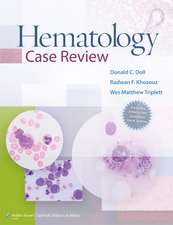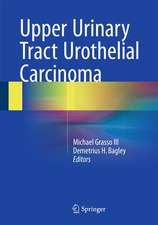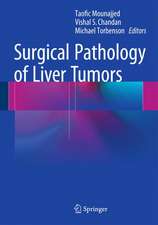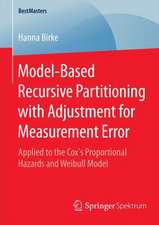Cancer Gene Profiling: Methods and Protocols: Methods in Molecular Biology, cartea 1381
Editat de Robert Grützmann, Christian Pilarskyen Limba Engleză Hardback – 15 dec 2015
Thorough and cutting-edge, Cancer Gene Profiling: Methods and Protocols, Second Edition is a great resource for any student or practitioner with an interest in cancer gene profiling, and can be used in any well-equipped research laboratory.
| Toate formatele și edițiile | Preț | Express |
|---|---|---|
| Paperback (2) | 774.76 lei 6-8 săpt. | |
| Springer – 27 mar 2019 | 774.76 lei 6-8 săpt. | |
| Humana Press Inc. – 7 mar 2012 | 960.86 lei 38-44 zile | |
| Hardback (2) | 700.39 lei 38-44 zile | |
| Humana Press Inc. – 6 noi 2009 | 700.39 lei 38-44 zile | |
| Springer – 15 dec 2015 | 726.32 lei 6-8 săpt. |
Din seria Methods in Molecular Biology
- 9%
 Preț: 791.59 lei
Preț: 791.59 lei - 23%
 Preț: 598.56 lei
Preț: 598.56 lei - 20%
 Preț: 882.95 lei
Preț: 882.95 lei -
 Preț: 252.04 lei
Preț: 252.04 lei - 5%
 Preț: 802.69 lei
Preț: 802.69 lei - 5%
 Preț: 729.61 lei
Preț: 729.61 lei - 5%
 Preț: 731.43 lei
Preț: 731.43 lei - 5%
 Preț: 741.30 lei
Preț: 741.30 lei - 5%
 Preț: 747.16 lei
Preț: 747.16 lei - 15%
 Preț: 663.45 lei
Preț: 663.45 lei - 18%
 Preț: 1025.34 lei
Preț: 1025.34 lei - 5%
 Preț: 734.57 lei
Preț: 734.57 lei - 18%
 Preț: 914.20 lei
Preț: 914.20 lei - 15%
 Preț: 664.61 lei
Preț: 664.61 lei - 15%
 Preț: 654.12 lei
Preț: 654.12 lei - 18%
 Preț: 1414.74 lei
Preț: 1414.74 lei - 5%
 Preț: 742.60 lei
Preț: 742.60 lei - 20%
 Preț: 821.63 lei
Preț: 821.63 lei - 18%
 Preț: 972.30 lei
Preț: 972.30 lei - 15%
 Preț: 660.49 lei
Preț: 660.49 lei - 5%
 Preț: 738.41 lei
Preț: 738.41 lei - 18%
 Preț: 984.92 lei
Preț: 984.92 lei - 5%
 Preț: 733.29 lei
Preț: 733.29 lei -
 Preț: 392.58 lei
Preț: 392.58 lei - 5%
 Preț: 746.26 lei
Preț: 746.26 lei - 18%
 Preț: 962.66 lei
Preț: 962.66 lei - 23%
 Preț: 860.21 lei
Preț: 860.21 lei - 15%
 Preț: 652.64 lei
Preț: 652.64 lei - 5%
 Preț: 1055.50 lei
Preț: 1055.50 lei - 23%
 Preț: 883.85 lei
Preț: 883.85 lei - 19%
 Preț: 491.88 lei
Preț: 491.88 lei - 5%
 Preț: 1038.84 lei
Preț: 1038.84 lei - 5%
 Preț: 524.15 lei
Preț: 524.15 lei - 18%
 Preț: 2122.34 lei
Preț: 2122.34 lei - 5%
 Preț: 1299.23 lei
Preț: 1299.23 lei - 5%
 Preț: 1339.10 lei
Preț: 1339.10 lei - 18%
 Preț: 1390.26 lei
Preț: 1390.26 lei - 18%
 Preț: 1395.63 lei
Preț: 1395.63 lei - 18%
 Preț: 1129.65 lei
Preț: 1129.65 lei - 18%
 Preț: 1408.26 lei
Preț: 1408.26 lei - 18%
 Preț: 1124.92 lei
Preț: 1124.92 lei - 18%
 Preț: 966.27 lei
Preț: 966.27 lei - 5%
 Preț: 1299.99 lei
Preț: 1299.99 lei - 5%
 Preț: 1108.51 lei
Preț: 1108.51 lei - 5%
 Preț: 983.72 lei
Preț: 983.72 lei - 5%
 Preț: 728.16 lei
Preț: 728.16 lei - 18%
 Preț: 1118.62 lei
Preț: 1118.62 lei - 18%
 Preț: 955.25 lei
Preț: 955.25 lei - 5%
 Preț: 1035.60 lei
Preț: 1035.60 lei - 18%
 Preț: 1400.35 lei
Preț: 1400.35 lei
Preț: 726.32 lei
Preț vechi: 764.55 lei
-5% Nou
Puncte Express: 1089
Preț estimativ în valută:
138.100€ • 143.59$ • 115.68£
138.100€ • 143.59$ • 115.68£
Carte tipărită la comandă
Livrare economică 25 martie-08 aprilie
Preluare comenzi: 021 569.72.76
Specificații
ISBN-13: 9781493932030
ISBN-10: 1493932039
Pagini: 224
Ilustrații: X, 256 p. 48 illus., 24 illus. in color.
Dimensiuni: 178 x 254 x 16 mm
Greutate: 0.68 kg
Ediția:2nd ed. 2016
Editura: Springer
Colecția Humana
Seria Methods in Molecular Biology
Locul publicării:New York, NY, United States
ISBN-10: 1493932039
Pagini: 224
Ilustrații: X, 256 p. 48 illus., 24 illus. in color.
Dimensiuni: 178 x 254 x 16 mm
Greutate: 0.68 kg
Ediția:2nd ed. 2016
Editura: Springer
Colecția Humana
Seria Methods in Molecular Biology
Locul publicării:New York, NY, United States
Public țintă
Professional/practitionerCuprins
Factors Affecting the Use of Human Tissues in Biomedical Research: Implications in the Design and Operation of a Biorepository.- Tissue Microdissection.- Tissue Microarrays.- Gene Expression Analysis in the Age of Mass Sequencing: An Introduction.- Quantitative DNA Methylation in Cancer.- Single Nucleotide Polymorphism to Associate Cancer Risk.- Exosomes in Cancer Disease.- MicroRNAs (miRNAs) Profiling.- Cancer Gene Profiling for Response Prediction.- Target Gene Discovery for Novel Therapeutic Agents in Cancer Treatment.- Application of Proteomics in Cancer Biomarker Discovery: GeLC-MS/MS.- Meta-Analysis of Cancer Gene Profiling Data.- Reproducible, Scalable Fusion Gene Detection from RNA-Seq.- Transcriptome Sequencing for the Detection of Chimeric Transcripts.
Textul de pe ultima copertă
This second edition volume brings together the experiences of leading scientists in the discipline of cancer gene profiling. Because cancer genes can be profiled in many different ways, Cancer Gene Profiling: Methods and Protocols, Second Edition explores different techniques and approaches needed to understand the key stages of cancer development, as using only one technique would be insufficient. This book provides readers with an overview of the state-of-the-art methods that will enable them to perform these experiments, and demonstrates the kind of analysis that is possible in our current biomedical research. Written in the highly successful Methods in Molecular Biology series format, chapters include introductions to their respective topics, lists of the necessary materials and reagents, step-by-step, readily reproducible laboratory protocols, and tips on troubleshooting and avoiding known pitfalls.
Thorough and cutting-edge, Cancer Gene Profiling: Methods and Protocols, Second Edition is a great resource for any student or practitioner with an interest in cancer gene profiling, and can be used in any well-equipped research laboratory.
Thorough and cutting-edge, Cancer Gene Profiling: Methods and Protocols, Second Edition is a great resource for any student or practitioner with an interest in cancer gene profiling, and can be used in any well-equipped research laboratory.
Caracteristici
Includes cutting-edge methods and protocols Provides step-by-step details essential for reproducible results Contains key notes and implementation advice from the experts Includes supplementary material: sn.pub/extras
Recenzii
From the reviews:
“The team of over 60 contributors put together an impressive compilation, covering a whole process of genetic analysis of cancer tissue … . Usefulness of the book is increased by the fact that most of the methods are optimized for real-life clinical tissue samples not just cell lines. … All in all, this book clearly demonstrated that the molecular methods used in the diagnosis and research of cancer, and of any other disease for that matter, entered the 21st century.” (J. Markus, Neoplasma, March, 2011)
“The team of over 60 contributors put together an impressive compilation, covering a whole process of genetic analysis of cancer tissue … . Usefulness of the book is increased by the fact that most of the methods are optimized for real-life clinical tissue samples not just cell lines. … All in all, this book clearly demonstrated that the molecular methods used in the diagnosis and research of cancer, and of any other disease for that matter, entered the 21st century.” (J. Markus, Neoplasma, March, 2011)
















